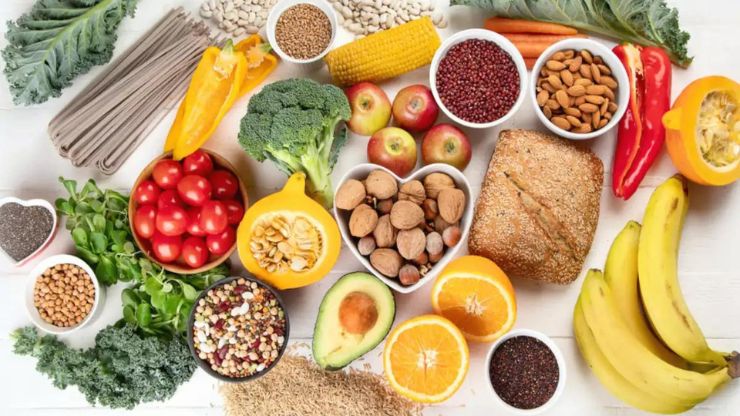Delicious Foods that Help Digestion – Digestive health is a fundamental aspect of overall well-being, and the foods we consume play a pivotal role in maintaining it. The process of digestion is complex, and sometimes our bodies need a little extra help to ensure everything runs smoothly. Fortunately, nature provides us with a wide array of delicious foods that can assist in this endeavor.
In this article, we will explore a selection of foods that are not only tasty but also beneficial for digestion. From fiber-rich whole grains to probiotic-packed yogurt, from soothing ginger to lean protein sources, we will uncover how these dietary choices can contribute to a healthier gut and smoother digestion. Moreover, we’ll discuss the significance of staying adequately hydrated and the benefits of consuming smaller, more frequent meals.
By the end of this article, you’ll have a comprehensive understanding of how these foods can help you support your digestive system, leading to better overall health and vitality. So, let’s delve into the world of delicious foods that aid digestion and make informed dietary choices for your well-being.
Table of Contents
ToggleImportance of digestive health
Digestive health is of paramount importance for several key reasons:
- Nutrient Absorption: The digestive system is responsible for breaking down the food we consume into its essential nutrients, such as carbohydrates, proteins, fats, vitamins, and minerals. These nutrients are then absorbed into the bloodstream and distributed throughout the body. Without proper digestion, the body cannot efficiently extract and utilize these vital nutrients, leading to nutritional deficiencies.
- Energy Production: The nutrients derived from digestion serve as the body’s primary source of energy. A healthy digestive system ensures that energy is readily available to support daily activities, metabolism, and overall vitality.
- Immune Function: A significant portion of the body’s immune system resides in the gut. A well-functioning digestive system helps maintain a balanced and diverse population of beneficial gut bacteria, which plays a crucial role in supporting immune function and defending against pathogens.
- Gastrointestinal Comfort: Good digestive health is associated with reduced occurrences of gastrointestinal discomfort, such as bloating, gas, indigestion, and constipation. This contributes to an improved quality of life and a higher level of comfort.
- Weight Management: An efficient digestive system can help regulate appetite and prevent overeating. Additionally, it aids in the breakdown of dietary fats, contributing to a healthier body weight.
- Mental Well-Being: The gut-brain connection, often referred to as the gut-brain axis, highlights the significant impact of digestive health on mental well-being. An imbalanced gut can be associated with mood disorders, anxiety, and even depression. Therefore, maintaining a healthy gut is essential for emotional and psychological health.
- Disease Prevention: Certain digestive disorders, such as irritable bowel syndrome (IBS), inflammatory bowel disease (IBD), and colorectal cancer, can be prevented or their risks reduced by promoting good digestive health through a balanced diet and lifestyle.
- Detoxification: The digestive system helps eliminate waste products and toxins from the body. An inefficient digestive system can lead to the accumulation of harmful substances, potentially contributing to health issues.
Also, Read – High Protein Breakfasts
Delicious Foods that Help Digestion
Ginger

Ginger, a versatile and flavorful root, is celebrated for its digestive benefits. This aromatic spice has a long history of soothing stomach discomfort and reducing inflammation. Whether consumed as ginger tea, added to dishes, or used in natural remedies, its active compounds can alleviate indigestion and nausea, making it a go-to choice for those seeking digestive relief.
Additionally, ginger’s warm and zesty flavor adds a delightful kick to a wide range of culinary creations, from soups to stir-fries, making it a popular and delicious ingredient for both health and flavor-conscious individuals.
Yogurt
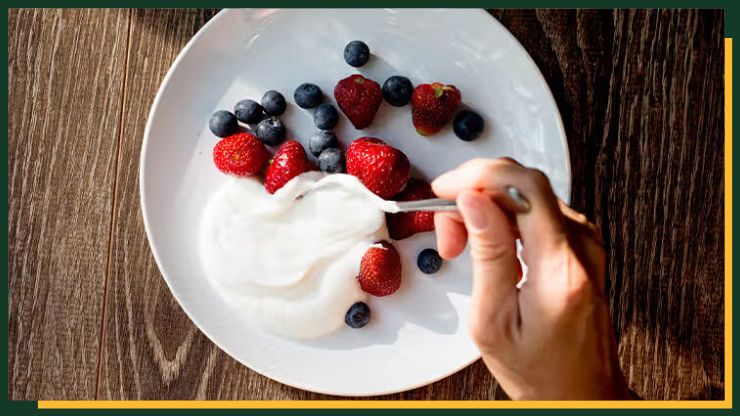
Yogurt, a creamy and nutritious dairy product, is revered for its digestive benefits. This versatile food is packed with probiotics—beneficial bacteria that support gut health and improve digestion. Regular consumption of yogurt can help maintain a balanced gut microbiome, enhancing the body’s ability to break down food and absorb nutrients.
Opting for plain, unsweetened yogurt is the healthiest choice, as it avoids the added sugars often found in flavored varieties. Whether enjoyed on its own, mixed with fruit and honey, or used in cooking and smoothies, yogurt is a delicious and convenient way to promote digestive wellness while offering a rich and satisfying taste.
Papaya

Papaya, a tropical fruit known for its vibrant orange flesh and sweet flavor, offers digestive benefits through the presence of an enzyme called papain. This enzyme aids in breaking down proteins and can be particularly helpful for those with digestive issues.
Papaya is not only a delicious snack but also a natural remedy for indigestion, bloating, and constipation. It’s often enjoyed fresh, in fruit salads, or blended into refreshing smoothies. With its luscious taste and digestive aid properties, papaya is a flavorful and healthy addition to your diet, contributing to better digestive comfort while tantalizing your taste buds.
Also, Read – Guilt-Free Veggie Breakfasts
Bananas

Bananas, the popular and portable tropical fruit, are not only delicious but also promote healthy digestion. They are rich in dietary fiber, particularly pectin, which aids in regulating bowel movements and preventing constipation.
Their gentle nature makes them an ideal choice for those with sensitive stomachs or digestive issues. Bananas are easy to digest and offer a quick source of energy due to their natural sugars.
Whether enjoyed as a convenient on-the-go snack or added to breakfast cereals, smoothies, or desserts, bananas are a versatile and satisfying fruit that supports digestive regularity while satisfying your taste buds with their natural sweetness.
Peppermint

Peppermint, a refreshing herb with a distinct minty flavor, offers digestive benefits by relaxing the muscles of the gastrointestinal tract. It contains compounds like menthol that can alleviate symptoms of indigestion, gas, and bloating.
Peppermint is commonly consumed as peppermint tea, which provides a soothing and aromatic solution for digestive discomfort. The tea’s soothing properties can ease stomach tension and improve overall digestion.
Additionally, peppermint oil is used in various forms, including capsules, to address digestive issues and enhance comfort. Its invigorating taste and digestive benefits make peppermint a delightful and effective natural remedy for common digestive concerns, promoting a calmer and more comfortable stomach.
Don't just scroll, subscribe!
BuzzTrail's unique web-stories are the cure for boredom you've been waiting for.
Fennel

Fennel, a versatile herb with a mild, licorice-like flavor, offers several digestive benefits. It contains compounds that can alleviate bloating, gas, and indigestion. Fennel seeds, often used in cooking and herbal remedies, have been employed for generations to ease various digestive discomforts.
Fennel tea, made from crushed fennel seeds, is a popular choice for promoting digestion and providing a soothing, aromatic beverage. The tea’s natural oils and compounds help relax the muscles of the gastrointestinal tract, reducing symptoms of discomfort.
Fennel is also rich in dietary fiber, which aids in regular bowel movements. Its distinct taste and digestive properties make fennel a flavorful and effective solution for promoting digestive wellness.
Oatmeal
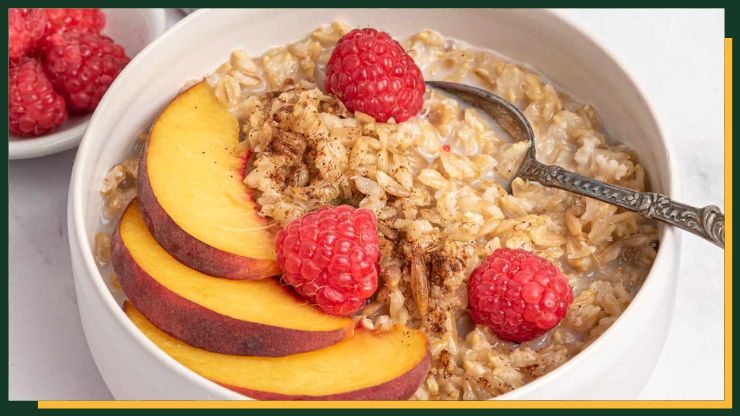
Oatmeal, a versatile and nutritious whole grain, is celebrated for its digestive benefits. It’s a rich source of soluble fiber, particularly beta-glucans, which can support digestion and help regulate blood sugar levels.
Oatmeal’s fiber content aids in preventing constipation and promoting regular bowel movements. Whether enjoyed as a warm and comforting breakfast option or incorporated into a variety of recipes, oatmeal is a wholesome choice for those seeking digestive comfort and sustained energy.
Its versatility allows for endless customization with fruits, nuts, or sweeteners, making it a delicious and convenient way to support digestive health while enjoying a satisfying and nourishing meal.
Apples

Apples, a widely enjoyed fruit, are renowned for their digestive benefits. They are a rich source of both soluble and insoluble fiber, which promotes healthy digestion. The soluble fiber, primarily pectin, aids in regulating bowel movements, preventing constipation, and maintaining digestive regularity.
Apples’ natural sweetness and high water content add to their appeal as a hydrating and satisfying snack. Consuming the skin of the apple provides extra fiber and nutrients.
Whether savored on their own or sliced into salads or oatmeal, apples are a convenient and delicious way to support digestive wellness. Their crisp texture and sweet-tart taste make them a refreshing and nutritious addition to your diet.
Sauerkraut
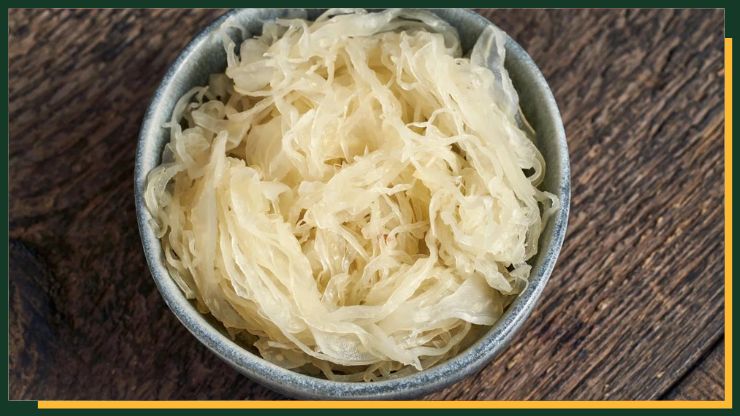
Sauerkraut, a fermented cabbage dish, is a digestive powerhouse. It’s created through a natural fermentation process that preserves the cabbage with the help of beneficial bacteria, known as probiotics.
These live microorganisms, such as Lactobacillus, support gut health and enhance digestion. Sauerkraut’s sour and tangy flavor adds a unique dimension to meals. The probiotics in sauerkraut can improve the balance of the gut microbiome, aiding in the breakdown of food and nutrient absorption.
This traditional dish is not only a flavorful condiment or side dish but also a natural way to promote digestive well-being, making it a tasty and health-conscious addition to your diet.
Avocado
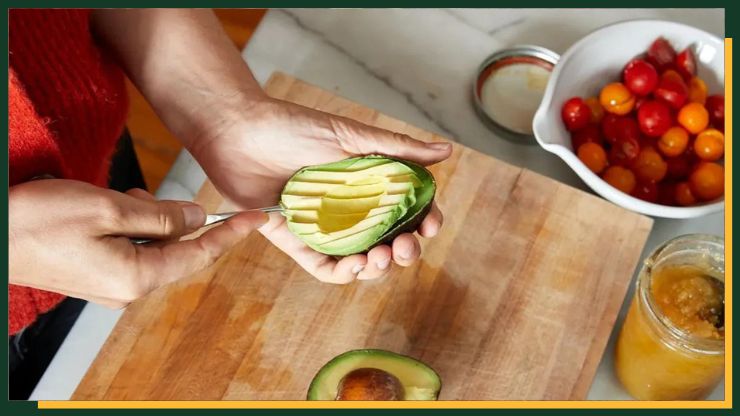
Avocado, a creamy and nutrient-dense fruit, is not only delicious but also promotes healthy digestion. Rich in healthy monounsaturated fats and dietary fiber, avocados aid in smooth digestion and help you feel full and satisfied.
They are easy on the stomach and provide sustained energy. Avocados also contain essential vitamins and minerals that support overall health. Their mild, buttery flavor is a versatile addition to salads, sandwiches, and smoothies.
Whether sliced, mashed into guacamole, or blended into a green smoothie, avocados are a delectable way to enhance your digestive comfort while enjoying their rich and satisfying taste.
Conclusion
In conclusion, prioritizing digestive health through a diet rich in fiber, probiotics, and wholesome foods, along with proper hydration and portion control, can significantly enhance overall well-being.
A well-functioning digestive system not only ensures nutrient absorption but also supports immune function, mental health, and disease prevention.
By making conscious choices and avoiding trigger foods, you can embark on a path to improved digestion, leading to a healthier and more comfortable life. Remember, consult with a healthcare professional for personalized guidance on your digestive health journey.
FAQs
What are some high-fiber foods that aid digestion?
What are some high-fiber foods that aid digestion?
Foods like whole grains, fruits, and vegetables are rich in fiber and can promote healthy digestion.
How do probiotic-rich foods benefit digestion?
How do probiotic-rich foods benefit digestion?
Probiotics, found in foods like yogurt and sauerkraut, promote a balanced gut microbiome, which supports digestion and overall gut health.
Can ginger and peppermint really help with digestion?
Can ginger and peppermint really help with digestion?
Yes, ginger and peppermint have been shown to alleviate digestive discomfort and soothe the digestive system.

